|
|
|
Sort Order |
|
|
|
Items / Page
|
|
|
|
|
|
|
| Srl | Item |
| 1 |
ID:
149793


|
|
|
|
|
| Summary/Abstract |
Space capabilities are important for national growth and well-being. They impact civil development and national security in equal measure. At the same time, space capabilities are costly assets with many applications and are in great demand. The need for optimal and balanced exploitation of resources demands a practical space policy that serves to fulfill the demands of most stakeholders and is in line with global trends. In the case of large countries like India, with an equally large population of over 1.28 billion, the complexities are varied and manifold, as are the challenges and opportunities. India’s national space policy, at present, is limited in scope with a focus on communication and remote sensing satellites. As India’s space capabilities and competencies grow, the need for a broader national space policy rises. India is cognizant of this, and this article discusses the various challenges in the formulation of a comprehensive national space policy for India.
|
|
|
|
|
|
|
|
|
|
|
|
|
|
|
|
| 2 |
ID:
149794


|
|
|
|
|
| Summary/Abstract |
India’s space program has traversed its journey from fishing hamlet—Thumba—to the Red Planet—Mars—with governmental support. Today, the Indian government seeks to realize the technological and financial potential of the private sector and is looking to share its financial burden with them. So long as space activities were completely in the governmental domain, there was not a preference for national space legislation. However, with private actor participation, it cannot be ignored, because even though the activities are private, liability is always public. On the basis of international space law, states bear international responsibility for all their space activities, including activities of non-governmental entities, which explicitly require authorization and supervision from states. There is already a political will in India and it is expected that national space legislation will be another accomplishment for the Indian space program, opening up participation by private players.
|
|
|
|
|
|
|
|
|
|
|
|
|
|
|
|
| 3 |
ID:
149792
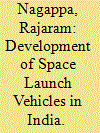

|
|
|
|
|
| Summary/Abstract |
The Indian space program is a spacefaring success story with demonstrated capability in the design and building of application and scientific satellites, and the means to launch them into desired orbits. The end-to-end mission planning and execution capability comes with a high emphasis on self-reliance. Sounding rockets and small satellite launch vehicles provided the initial experience base for India. This experience was consolidated and applied to realize larger satellite launch vehicles. While many of the launch vehicle technologies were indigenously developed, the foreign acquisition of liquid propulsion technologies did help in catalyzing the development efforts. In this case, launch vehicle concept studies showed the inevitability of using a cryogenic upper stage for geosynchronous Earth orbit missions, which proved to be difficult technically and encountered substantial delays, given the geopolitical situation. However, launch capability matured from development to operational phases, and today, India’s Polar Satellite Launch Vehicle and Geosynchronous Satellite Launch Vehicle are in a position to meet both domestic and international market demands.
|
|
|
|
|
|
|
|
|
|
|
|
|
|
|
|
| 4 |
ID:
149795


|
|
|
|
|
| Summary/Abstract |
Today, India enjoys the status of a spacefaring state. It is the national space agency—the Indian Space Research Organization—which created the culture of self-reliant space technology through its space program achievements. Even though there are emergent private actors in addition to the national space agency, it is very difficult to realize their potential in space in India. Because the national space program is societal-centric and application-centric, space commercialization is constrained. Nevertheless, there is interest in overcoming these constraints and in enabling a role for private space actors in India. In such a scenario, legal regulations are required. Within this context, is the existing legal regulatory framework sufficient, and has India already considered a vital role to regulate private actors in space? Also, are there global influences? This article analyzes these queries.
|
|
|
|
|
|
|
|
|
|
|
|
|
|
|
|
| 5 |
ID:
149796
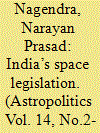

|
|
|
|
|
| Summary/Abstract |
India is a long-term investor in building up indigenous space infrastructure and facilities to develop rockets, satellites, and ground systems. However, the space sector is mainly government driven, with private industry participation limited to contributing to the missions executed by the Indian Space Research Organization. With the emergence of the New Space sector, there is a growing private space industry in India that needs to be supported by establishing legal aspects of space activities for private industry activities. This is important at both the international and national level, with the former needing consideration under the purview of the international treaty obligations of India and the latter for the development of the private industry ecosystem. In the present work, we explore some of the fundamental aspects of policies that need to be addressed in the process of forming national space legislation by the government of India. Recommendations in establishing a supportive ecosystem to encourage private space industry activity on a number of important issues are discussed herein.
|
|
|
|
|
|
|
|
|
|
|
|
|
|
|
|
| 6 |
ID:
149797


|
|
|
|
|
| Summary/Abstract |
Over the past five decades, India has progressed to create one of the largest national space programs in the world, delivering space-based technology to solve the problems of man and society. The present work provides an overview of current trends regarding industry participation in the national space program of India. While insight into industry participation and upstream activity is provided in the space transportation and development of satellite systems, commercial aspects of satellite communication services, use of geospatial data, and navigation and timing services are addressed as a part of the downstream applications. Specific recommendations to expand the footprint of the participation of Indian industry in the utilization of space technology nationally with possible expansion internationally are provided herein for space program managers and policymakers for both the upstream and downstream activities.
|
|
|
|
|
|
|
|
|
|
|
|
|
|
|
|
| 7 |
ID:
149790
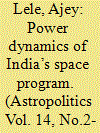

|
|
|
|
|
| Summary/Abstract |
Space power is a relatively nascent discourse that is gaining importance globally. This article examines India’s space program within the global context in order to understand the shifting power balance in the space arena. The article first clarifies contextual variants of the definition of power, recalibrating those formulations to the space context. This is followed by an examination of the Indian space program—its evolution historically, current limitations, and increasing relevance today. Space is a versatile domain and, due to its interconnected nature, it impacts the world. Hence, this article also examines global engagements and collaborative efforts being made across borders, and the strategic modalities involved in traversing such sensitive diplomatic terrain. Finally, the article concludes by reiterating the soft power and hard power potentials of the space arena, whose versatility contributes towards intrinsic national growth and extrinsic power projections.
|
|
|
|
|
|
|
|
|
|
|
|
|
|
|
|
| 8 |
ID:
149789
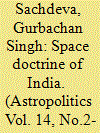

|
|
|
|
|
| Summary/Abstract |
The tradition of promulgating military doctrines exists from time immemorial. In India, the same concept was adapted for civil purposes in the case of a nuclear doctrine. Herein, a space doctrine of India is proposed. From the beginning of space activities, India did not have an articulated, directive space policy. Nevertheless, India achieved successes in space activities ranging from indigenous launch to scientific probes to the Moon and Mars. Today, India is a space power of global standing and a space doctrine represents an authentic expression of India’s stance on space governance and space activities. The doctrine suggested in this article is one of resolve of the state to dedicate itself to a committed vision of collective prosperity through space activities, collective welfare of humankind, equity sharing with all stakeholders, and sustainability in the use of the space environment. It is an authoritative and emphatic statement on intended uses of outer space, an almanac of governing practices, and an enabler of regulation and supervision of national space activities in outer space.
|
|
|
|
|
|
|
|
|
|
|
|
|
|
|
|
| 9 |
ID:
149791
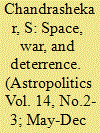

|
|
|
|
|
| Summary/Abstract |
India must accept and deal with the reality that conflicts and wars in today’s world will be driven by the increasing interdependence between conventional, nuclear, and space war. The role of space-based command, control, communications, computers, intelligence, surveillance, and reconnaissance (C4ISR) assets, complemented by other ground- and space-based space situational awareness (SSA) components, is critical for deciding on the new national strategy for waging war and for the deterrence of war. Increasingly, the U.S.-China space dynamic determines the evolution of the global space order. To translate these challenges into an operational capability, India requires, at a minimum, a four-fold increase in capability to launch satellites into various orbits every year. The integration of C4ISR and SSA capabilities into a seamless network that facilitates real-time action is the key organizational and institutional component of the new strategy. More than the technology initiatives, the implementation of this strategy necessitates a clear aspiration on the part of India that it does have an important role to play on the global stage, and that it will carry out the organizational and institutional reforms for defending its national interests and national security.
|
|
|
|
|
|
|
|
|
|
|
|
|
|
|
|
|
|
|
|
|